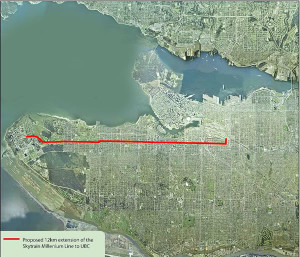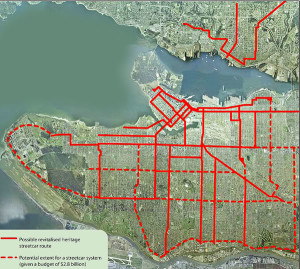The unaffordable subway: Metro Vancouver scheme has the hallmarks of a pro-development and deeply flawed transit strategy (by Elizabeth Murphy, in Common Ground, June 2016)
For the price of this:
We can have this:
Equivalent electric streetcar network deliverable for same cost of proposed Broadway Corridor subway (Prof. Patrick Condon, et al, 2008, “The case for the tram; learning from Portland, Sustainability by Design: An examination of alternatives to an underground extension of the Millennium Line to UBC.” Foundational Research Bulletin, No. 6.)
Using electric trolley buses or a mix with streetcars would even allow much broader coverage across the region for the same funds as one subway on Broadway.
Providing an expanded and improved transit system is vital to Metro Vancouver and the provincial economy. However, the subway is a poor choice for the Broadway east-west thoroughfare. The current plans and funding models are promoted for corporate interests, but they are not in the public interest.
Last year, the public voted down, by a large margin, the plebiscite for a sales tax increase to cover the Metro Vancouver transportation plan. This plan is actually a real estate and tower development scheme led by a subway. Now the same plan is being put forward again – this time with much more problematic funding options that would put the public in unnecessary massive debt, without any pretence of public support.
The provincial government is failing to provide adequate funding for much needed transit while, at the same time, looking to benefit financially from development along an unaffordable Broadway corridor subway. So the civic level that receives only seven percent of the tax base is being required to take on this provincial funding responsibility (referred to as downloading) without the resources to fulfill it.
The province refuses to consider using the obvious and appropriate funding source: the carbon tax. Funding options being considered are property taxes and development that would be downloading onto cities. Transit fare increases add to the cost of living for those who can least afford it and further discourage transit use.
Property taxes are the main source of funding for civic governments that have correctly resisted provincial moves to try to take them for provincial purposes to fund transit. That resistance is now softening.
Although the property tax mill rate per thousand dollars of property value is considered low in Vancouver, actual property taxes are based on sky-high assessments that affect the cost of homeownership and are passed on to renters. Property taxes are already tapped out for civic purposes.
Read full article online in Common Ground:
https://commonground.ca/the-unaffordable-subway/
*************
.












